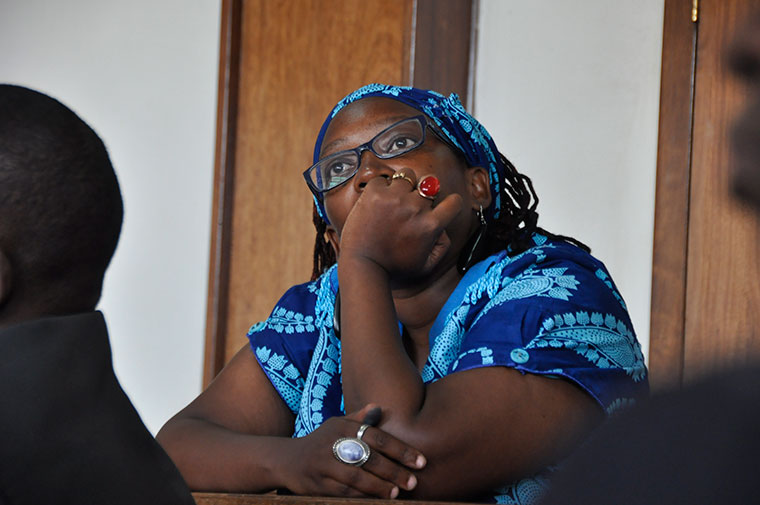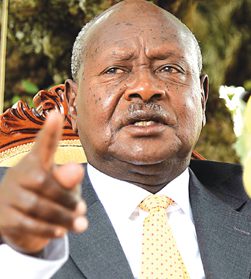Political activist and devoted mother Stella Nyanzi, a strong gay ally, has been imprisoned again, this time for new online insults directed at Uganda’s strongman president, Yoweri Museveni, and his family.

Imprisoned activist mom Stella Nyanzi again faces charges in court. (Photo courtesy of The Observer)
In prison, Nyanzi has proved herself to be a dedicated mother as well as a fierce anti-Museveni activist.
Photographs of letters from her prison cell were posted on her Facebook page. Transcribed on this blog, they include a loving letter to her daughter as well as a description of the harsh conditions in Luzira Women’s Prison and a protest against police abuse of a young mother who was arrested and beaten.

Ugandan President Yoweri Museveni
Nyanzi was charged with “cyber harassment and offensive communication” under the country’s Computer Misuse Act of 2011. She was arrested after publishing a poem on Facebook on Sept. 16, right after Museveni’s 74th birthday, in which she stated that Uganda would have been better off if Museveni had died at birth.
She pleaded not guilty and is currently in prison awaiting a further court appearance on Nov. 22. If convicted, she faces a penalty of a year’s imprisonment.
Nyanzi told the court that Museveni should be summoned to testify about how he was offended by her Facebook posts.
PEN International, which advocates worldwide for freedom of expression, demanded her release.
“While President Museveni has the right to take exception to Dr Nyanzi’s views, he does not have the right to gag people who find his rule oppressive,” said Dr. Danson Sylvester Kahyana, president of PEN Uganda.
‘Radical rudeness’ as a political tactic
The Rand Daily Mail explained:
“She has embraced a Ugandan tradition called “radical rudeness” that dates back to the pre-independence days of the late 1940s. At the time power relations were encoded in manners, politeness, and conventional rituals of sociability as determined by the British masters.
“As historian Carol Summers has written, activists in colonial Uganda, especially the kingdom of Buganda, disrupted this power relationship by using tactics of rudeness, performing “a rude, publicly celebrated strategy of insults, scandal mongering, disruption, and disorderliness that broke conventions of colonial friendship, partnership, and mutual benefit.”
Campaigner for LGBTQIA+ rights and women’s rights
South Africa’s Mail & Guardian wrote about Nyanzi:
Nyanzi is a medical anthropologist who has written about HIV/AIDS, sexuality and women’s health. She has campaigned for the rights of girls, women and LGBTQIA+ people in Uganda and leads Pads4GirlsUG a campaign to provide free sanitary pads to girls. She holds a PhD from the the London School of Hygiene and Tropical Medicine. She is also a leading scholar in the emerging field of African queer studies.

In an academic article, Stella Nyanzi analyzed the Uganda’s first pride celebration, in 2012. (Photo courtesy of RachelAdamsPhotography.com)
She is the author of numerous articles that provide sorely needed critical insight into the effects of patriarchy, misogyny and homophobia in Uganda, The Gambia and Tanzania. These include “Homosexuality, Sex Work, and HIV/AIDS in Displacement and Post-Conflict Settings: The Case of Refugees in Uganda” (published in International Peacekeeping, 2013) and “Queer Pride and Protest: A Reading of the Bodies at Uganda’s First Beach Pride”.
Her article “Dismantling Reified African Culture through Localised Homosexualities in Uganda” was published in the academic journal Culture, Health and Sexuality in 2013. In the piece Nyanzi critiques Uganda’s draconian Anti-Homosexuality Bill, which was introduced in 2009 and passed into law in February 2014. It was repealed on the grounds that it had been passed without a quorum in August that same year.
She argued that the justification for the Bill “lay in myopic imaginings of a homogeneous African-ness and pedestrian oblivion to pluralities within African sexualities.”
Her ethnographic research conducted with people in Uganda shows how, counter to the arguments that homosexuality is un-African, “same-sex-loving men, women and transgender people variously assert their African-ness.”
Uganda is one of 38 countries in Africa where homosexuality remains illegal.
COMMENTS